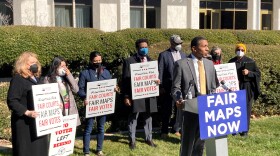-
Despite their opposition to the bill, Democrats in the North Carolina General Assembly worked with Republican bill sponsors on trying to soften the legislation's impact on the state's election system.
-
Jesse Thomas describes himself as a “no-nonsense Republican” who aims to attract a broad middle ground of voters. He announced his bid last week.
-
The justices on Tuesday rejected the broadest view of a legal theory that could have transformed elections for Congress and president by leaving state legislatures virtually unchecked by their state courts when dealing with federal elections.
-
Republicans delegates in North Carolina have voted to censure the state's senior U.S. senator for backing LGBTQ+ rights, immigration and gun violence policies.
-
A top House GOP leader announced on Thursday that Reps. Keith Kidwell and Jeff McNeely, who are both white, are no longer deputy majority whips after their resignations were sought by other GOP leaders. The Democrats who were the subject of the comments are both Black.
-
Experts say four Democratic incumbents are vulnerable when state legislators draw a new map later this year. The state’s highest court in late April threw out a 2022 Democratic ruling against partisan gerrymandering.
-
Former U.S. Rep. Mark Walker has formally joined next year's race for North Carolina governor. Walker made his announcement Saturday at a Baptist church in Kernersville.
-
The state Senate plans to consider first an override Tuesday afternoon. House Speaker Tim Moore’s chief of staff said the speaker then aims to complete the override later in the day should Senate Republicans be successful.
-
Following months of internal, closed-door conversations, Republicans moved quickly to pass new abortion regulations this week. The bill will soon be vetoed by Gov. Roy Cooper, and then likely overridden by Republicans in the legislature. This measure bans most abortions after 12 weeks. In our weekly review of state politics Dawn Vaughan of the News and Observer, and Chris Cooper, a Professor at Western Carolina University, offer analysis on the legislation.
-
On Friday, the North Carolina Supreme Court issued three rulings — spanning voter ID, redistricting, and voting access for people with felony convictions — that will have a deep impact on how the state conducts elections.
Play Live Radio
Next Up:
0:00
0:00
Available On Air Stations










